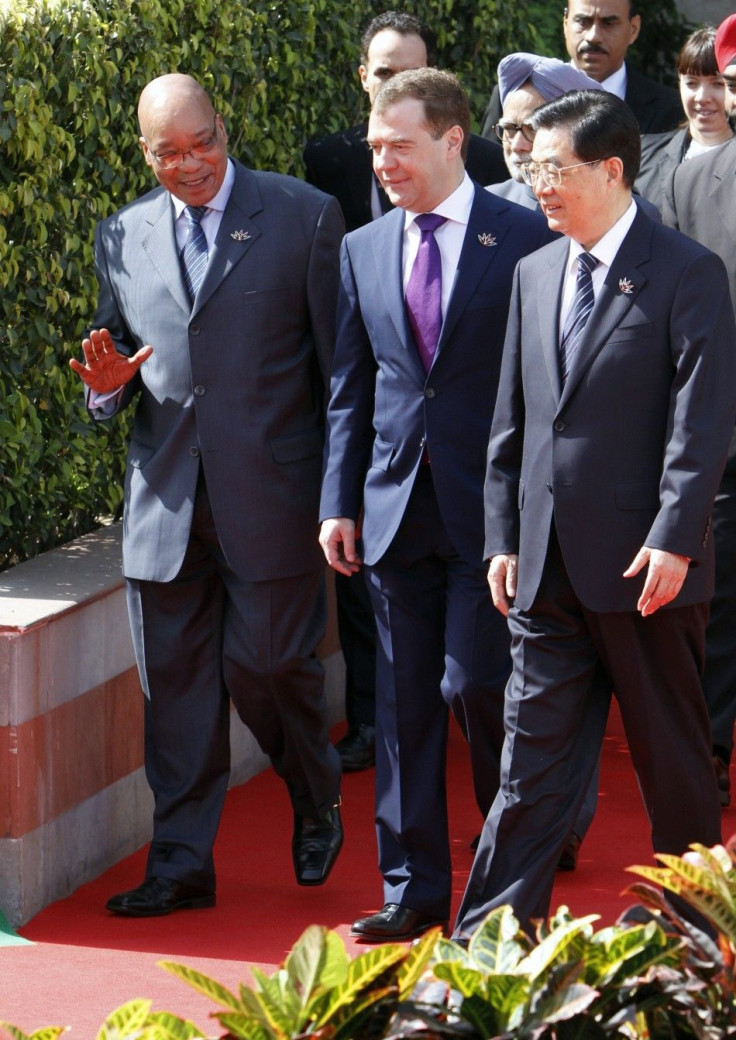4th Time's No Charm: Annual BRICS Summit Ends On Ho-Hum Note

After pre-summit posturing, statements attacking the West and rather awkward photo-ops, there were high hopes the fourth annual BRICS meeting, held in New Delhi this week, would end with a bang.
Instead it went out with the whimper cynics had predicted.
Two days of talks among the leaders of Brazil, Russia, India, China and South Africa wrapped up Friday with little to show other than a currency exchange and a lot of hopeful talk.
Even the potential blockbuster announcement of a BRICS development bank -- touted as an alternative to the World Bank -- ended up as a wait-and-see for the quintet's next summit, in Russia in 2013.
It wasn't all rhetorical flourish, however.
The group offered a rare united front on dealing with Iran, stressing dialogue and underlining the catastrophic consequences of a military struggle. That was in contrast to veiled threats against Iran from the United States and Europe, which have repeated that all options remain on the table.
The leaders signed two agreements to enhance intra-BRICS trading, aiming to promote growth in a market already valued at $230 billion and expanding by 28 percent a year.
In a joint statement, the five nations also labeled bank loans, bond buying and quantitative-easing measures by U.S. and European central banks in the aftermath of the global financial crisis aggressive policy actions that have flooded the developing world with excess liquidity.
However, as many economists have pointed out, the truth behind the global war of words over currency manipulation is somewhat less clear-cut than portrayed this week in New Delhi.
For trade advantages, some BRICS nations deliberately and artificially peg their currency at some value less than the US dollar; therefore, US monetary policy, specifically monetary easing, is highly inflationary to those nations, said Jamie Cox, managing partner at Harris Financial Group.
BRICs nations complain about the inflationary result of Western monetary policy yet have no desire to counter its effects by allowing their currencies to rise, he said. Obviously, for political purposes, these nations complain vociferously to maintain those trade advantages.
Better Luck Next Time
Despite its accomplishments, the summit failed to change the perception of the BRICS as a disparate bunch, united by little more than a shared moniker and distrust of Western power.
For starters, there was no joint endorsement of a potential World Bank candidate that could rival the U.S.-backed nominee, Dartmouth College professor Jim Yong Kim. If the BRICS nations really wanted to rattle the West, they could have insisted on their own candidate for the top job.
After all, a rejection by Washington or its main European allies, who hold the bulk of voting rights at the bank, would have been a rejection of nations representing 3 billion people, almost half the planet's population.
Underlying tensions between the two biggest members of the group, India and China, made it impossible for them to agree on a candidate, according to Martin Wolf, an economics commentator for the Financial Times.
The grouping has very specific jealousies within it, particularly the two most powerful members -- in terms of their potential, anyway -- China and India, he said in an interview with the Council on Foreign Relations.
There's a lot of mistrust between the two, and [it would be] very difficult for them to agree on a candidate.
The BRICS also failed to draft concrete plans for the South-South Development Bank, whose creation was announced on the first day of the summit.
Instead, the leaders instructed finance ministers to form a working group to examine the issue in detail and report back on the feasibility of such a project in 2013.
I don't regard the BRICS as a grouping of natural fellows, added Wolf.
There's no reason to expect them to agree on anything substantive in the world, except that the existing dominating powers should cede some of their influence and power.
Bland Response
The U.S. government's neutral response to the meeting suggests Washington doesn't see the BRICS as any threat to the existing international order.
We reviewed the leaders' Delhi declaration and believe that their efforts to engage in global multilateral institutions productively can only strengthen the international system, State Department spokesman Mark Toner said.
But perhaps the annual meeting shouldn't be viewed as a forum for announcing big things.
It could be seen instead as an exercise designed to raise awareness of the anti-West brand. A stage on which economically vibrant but geopolitically weak nations can keep issues they care about -- representation on the U.N. Security Council, more-inclusive voting at the World Bank, to name two -- at the top of the global agenda.
© Copyright IBTimes 2024. All rights reserved.





















